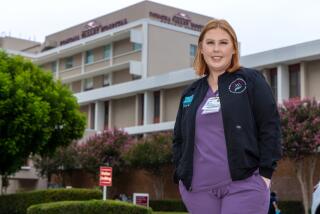2 RNs Seek Prescription to Heal Ailing Profession
- Share via
Susan Fertig McDonald and Paula Schenck sometimes wonder if they belong to an endangered species. Call it Registered Nurse.
Schenck has been a nurse for 11 years, McDonald for 21. Both have witnessed changes in nursing that parallel the change in society over the last 20 years.
Feminism has not been a friend to nursing, the women say. It has opened the door for women to chase scores of other opportunities, all the way from umpiring a baseball game to sitting on the Supreme Court.
Welby or Nightingale?
Nowadays, if women think of a medical career, Schenck and McDonald say, the role model is more likely to be Marcus Welby than Florence Nightingale.
Why be a nurse when you can be a doctor? the thinking goes. Today’s woman, they argue, is prone to suspect the stereotype of nurses: That they are subservient and secondary to men, tirelessly laboring in the shadow of a doctor.
Consequently, the nation now faces the worst shortage of nurses in its history, the women say, at a time when demand for nurses--and for elaborate nursing skills--has never been higher. The shortage is not as drastic in San Diego County as in other parts of the country, but it threatens to worsen, they say.
7% Fewer Nurses
McDonald, a nursing administrator at Vista Hill Hospital in Chula Vista, said that, in the last three years, San Diego County has suffered a 7% drop in its nursing population. That’s bad, she said, but the attrition is nothing like that in the East and Midwest, where the drop is as high as 25%.
Nurses are angry. A nursing strike in San Francisco recently resulted in a modest pay increase. McDonald said that, although San Diego County nurses are not nearly as prone to unionize as they are in San Francisco, labor unrest is not out of the question here.
It’s the shortage that has her worried. For that reason, Schenck and McDonald are part of a bi-county effort (covering San Diego and Imperial counties) that seeks to address the waning numbers of nurses and focus on recruitment and retention.
The two women are typical of some of the changes facing nurses. Although both are RNs who have worked in hospitals and labored by the bedsides of critically ill patients, Schenck now works as a medical litigation analyst; McDonald sits behind a desk, overseeing a corps of mental-health nurses. Schenck is more often found in a courtroom than a hospital; neither has worn the nurse’s white in years.
“It’s not that I hate nursing,” said Schenck, who, although a nurse, is a staff member of a local law firm. “I’m proud to be a nurse. I’d never be anything else. It got to the point where I knew I could do more. This was just one option--a better option than others--for furthering my career.”
Schenck assists doctors and attorneys in the preparation of lawsuits requiring medical expertise. She works mostly with defense attorneys in medical malpractice or personal-injury cases.
“It’s not intentional that I’ve worked mainly for defense lawyers,” she said. “It just worked out that way. We do some cases for plaintiffs, though not as many.”
Schenck, 33, mother of a 2-year-old child, confesses to the chronic woe for a nurse of the 1980s: Burnout.
She felt compelled to try something different after more than a decade of working with patients in hospitals.
“I felt I needed to get out,” she said. “Many nurses recognize they’re at a standstill. There’s a time when you have to get out. I can always go back to clinical nursing, if I need to.”
“But Paula, you are a nurse now ,” McDonald said, quickly correcting her. “It’s important to remember that nurses working jobs such as ours are working as nurses now. It’s the perspective we need to change.”
Both women say the image of nursing is at a nadir. Part of their mission, as they see it, is to bolster morale and lift spirits.
‘No Longer Glorified’
“The problem is, jobs aimed at helping people are no longer glorified in society,” said McDonald, 38. “To get ahead nowadays means something besides assisting other people. Teachers’ salaries are low, as are those of police officers and nurses. It isn’t a good situation. Society is oriented more towards self.
“The image goes up and down. It’s largely one of low pay, subservience. . . . And a lot of people don’t see nursing as a profession, which, clearly, it is.”
Nurses also feel they don’t get respect from doctors. The relationship, the women say, is more often marked by contentiousness and conflict than trust. McDonald said the American Medical Assn. is responding to the nursing shortage by advocating a concept known as RCT--registered care technician.
She describes RCT as a “dead-end career, minimum wage at best.” Schenck said RCTs will be expected to take over aspects of bedside care, such as checking a patient’s vital signs and emptying bedpans. Nurses consider the RCT movement a cost-cutting threat that won’t help them or medicine in general.
‘Experts in High Tech’
“The truth is, nurses are being asked to do more and more,” McDonald said. “The nurse’s job is far more complicated than it used to be. We’re experts in high-tech, computers, you name it. The demands include care for the elderly, hospices . . . demands are getting rougher all the time.”
“Patients in the hospitals nowadays are much sicker,” Schenck said. “That makes our job tougher. Outpatient care is the way. People having surgery are sometimes in and out in a day now. Medical care itself is changing. And we’re in the middle of it.”
Although feminism may have taken some women away from nursing, it hasn’t done much for men entering the field. McDonald said that only 3% of the nation’s nursing corps is male and that men working as nurses still battle homophobic stereotypes.
Money is hardly an inducement. The average salary for local nurses, McDonald said, hovers between $24,000 and $32,000 a year.
“The pros of being a nurse are having to be gifted at organization, communication, leadership and management,” Schenck said. “You can travel all over the country, working as a nurse. We can work in schools, for insurance companies, hospitals, law firms, even in fitness centers.”
“The cons are that the work is hard,” McDonald said. “Women who are not thrilled about challenges, dedication, hard work and fortitude just won’t make it. Unfortunately, too few women are nowadays.”






